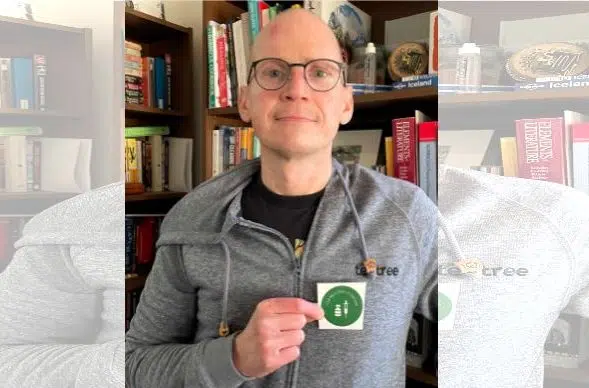A Saskatoon man’s cancer treatment schedule is in upheaval as health-care staff in Saskatchewan hospitals are being reassigned to care for COVID-related needs.
Tim Clarke’s condition isn’t usually painful, as long as he’s receiving treatment. Clarke has mycosis fungoides, a condition that turns certain white blood cells cancerous. It primarily affects his skin — he regularly gets surface tumours and rashy plaques.
He’s seeing his appointments for treatment being rescheduled because of the demand for staff to combat the rising hospitalizations due to COVID-19 in Saskatchewan.
Just found out that my good friends cancer treatment is being restructured because of unvaccinated people putting avoidable strain on the healthcare system. This was avoidable. @SKGov and @PremierScottMoe have failed the people of this province.
— Sara Irons (@saraschatz07) September 22, 2021
The common treatment for Clarke’s condition is PUVA, a combination of the drug, Psoralen (P) and exposure of the skin to long-wave ultraviolet light (UVA).
He receives extracorporeal photopheresis treatment, which involves being connected to a machine that removes blood, puts it through a centrifuge and collects the plasma. When enough is gathered, medication is added and then the plasma is exposed to UVA light that activates the medication. The treatment also suppresses immune cell populations.
This mild form of chemotherapy is something Clarke receives about once every two weeks at Royal University Hospital’s medical daycare. He’s grateful to have the technology to treat his condition so close to home — the next-nearest hospital with such facilities is as far away as the west coast.
“The whole point of this treatment is to suppress my immune system,” he explained.
That reality has made the COVID-19 pandemic a lot scarier for Clarke and his wife, who have spent most of the past year and a half in their home for Clarke’s well-being. Aside from seeing a few friends in their home for about a month over the summer, Clarke said he has lived a hermit’s existence since COVID-19 came to Saskatchewan.
He said he misses being with friends, going to movies and eating Vietnamese food in a restaurant.
“I haven’t been to Spicy Garden in a year and a half,” he said with a big laugh.
The growing numbers in Saskatchewan have put him more on edge over the past few weeks. He’s triple-vaccinated, having received a booster shot due to his immunocompromised condition. Clarke is grateful for that, but still worried.
“Going to the hospital is a little bit nerve-wracking right now,” he explained.
Even more stressful is having to adjust his schedule for changing treatment dates. Clarke’s next three appointments over the coming six weeks have been rescheduled because all patients receiving his form of treatment have been moved to one day a week.
Clarke’s disease is an indolent, meaning it’s slow-acting. His life expectancy, as a result, is pretty good, though lowered from a stem-cell transplant he previously received.
“I’m relatively stable as long as I’m getting treatment,” he explained.
Without it, Clarke said he’d likely only have months to live.
His illness is one that usually responds well to treatment, but Clarke hasn’t been so lucky. He had to permanently pause his chemical engineering studies after his diagnosis in 2008.
“Watching the whole pandemic unfold has been deeply frustrating,” Clarke said.
Before those studies, Clarke had majored in biochemistry, taking classes in microbiology, medical virology and molecular virology. His educational background, paired with the amount of time he’s spent in hospitals, has made it difficult for him to process the events of the pandemic.
Clarke said the pandemic response in Saskatchewan has always been partial and delayed, when implemented at all.
“To say this wasn’t predictable, I feel insulted,” Clarke said. “I can tell that somewhere inside of me I’m very angry about all of this.”
He said he’s also frustrated seeing the nurses in hospitals overworked and undersupported.
“I’m a little bit annoyed at having to change my schedule around for my treatments … Is this it? Is this the only thing? How far is this going to go?” he asked.
Clarke said he wants to encourage the public to get vaccinated and wear their masks, for the protection of both themselves and others.
“We are not at the stress test for our system yet. It is going to get significantly worse before it gets better,” he said.
“(It’s) deeply irresponsible to prize your version of freedom … over the health of your fellow citizens.”







